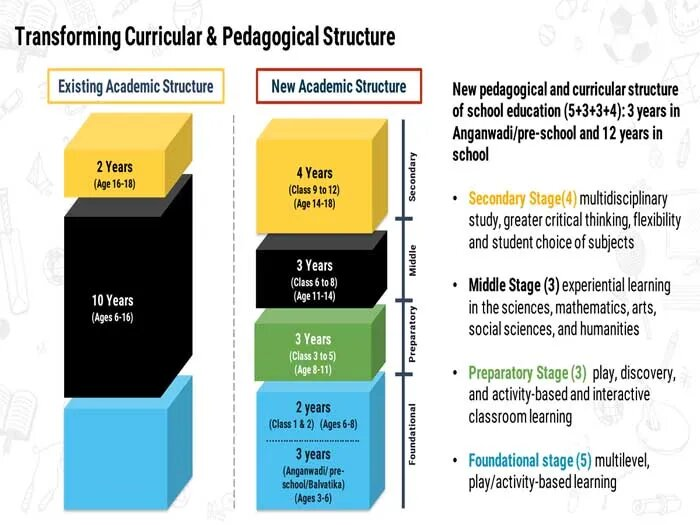Governance
National Curriculum Framework
- 24 Aug 2023
- 7 min read
For Prelims: National Curriculum Framework for School Education, National Education Policy 2020.
For Mains: Features of National Education Policy 2020, Major Issues Related to the Education Sector in India, Government Initiatives Related to Educational Reforms.
Why in News?
Recently, the final National Curriculum Framework (NCF) was released by the National Council of Educational Research and Training (NCERT), leading to significant reforms in the education system, led by the principles of the National Education Policy (NEP) 2020.
- The NCF introduces changes in language learning, subject structure, evaluation strategies, and environmental education, reshaping the educational landscape for Grades 3 to 12 under CBSE.
What are the Key Highlights of the National Curriculum Framework (NCF)?
- Language Learning:
- Students in Classes 9 and 10 learn three languages, with at least two being native Indian languages.
- In Classes 11 and 12, students will study two languages, including one of Indian origin.
- Aim to achieve a "literary level" of linguistic capacity in at least one Indian language.
- Board Exams and Evaluation:
- Students are allowed to take Board exams on at least two occasions in a school year.
- Only the best score among attempts will be retained.
- Students are allowed to take Board exams on at least two occasions in a school year.
- Alignment with NEP 2020:
- The NCF follows the guidelines of NEP 2020. Provides the framework for formulating new textbooks from Grades 3 to 12 under CBSE.
- Textbooks for Classes 3-12 aligned with 21st-century requirements.
- Focus on ensuring rootedness in the current context while being forward-looking.
- The NCF follows the guidelines of NEP 2020. Provides the framework for formulating new textbooks from Grades 3 to 12 under CBSE.
- Changes in Mandatory and Optional Subjects:
- Earlier, students in Classes 9 to 12 studied five mandatory subjects with an option to add one more.
- Now, the number of mandatory subjects for Classes 9 and 10 is seven, and for Classes 11 and 12 is six.
- Earlier, students in Classes 9 to 12 studied five mandatory subjects with an option to add one more.
- Optional Subjects:
- First group includes art education, physical education, and vocational education.
- The second group includes Social Science, Humanities, and interdisciplinary areas.
- The third group includes Science, Mathematics, and computational thinking.
- Flexibility and Choice for Students:
- Redesigned "Secondary Stage" to provide more flexibility and choice.
- No strict separation between academic and vocational subjects, or between Science, Social Science, Art, and Physical Education.
- Students can choose varied subject combinations for their School Leaving Certificates.
- Environmental Education:
- Emphasis on environmental awareness and sustainability.
- Environmental Education integrated across all schooling stages.
- Separate area of study dedicated to environmental education in the Secondary Stage.
- Content Distribution for Social Science Curriculum (Classes 6-8):
- 20% content from local level.
- 30% content from regional level.
- 30% content from national level.
- 20% content from global level.
What is the National Curriculum Framework?
- About:
- NCF is one of the key components of the New Education Policy (NEP) 2020, that enables and energizes this transformation, informed by the aims, principles, and approach of NEP 2020.
- The NCF has undergone four revisions in the past - in 1975, 1988, 2000, and 2005. The proposed revision, if implemented, would be the fifth iteration of the framework.
- Four Sections of NCF:
- NCF for School Education (NCF-SE)
- NCF for Early Childhood Care and Education (Foundational Stage)
- NCF for Teacher Education
- NCF for Adult Education
- Objective:
- It aims to help in positively transforming the school education system of India as envisioned in NEP 2020, through corresponding positive changes in the curriculum including pedagogy.
- It aims to realize the highest quality education for all children, consistent with realizing an equitable, inclusive, and plural society as envisaged by the Constitution of India.
What is the National Education Policy 2020?
- About:
- The NEP 2020 is a comprehensive framework for education reform in India that was approved in 2020, aiming to bring significant changes in the education system of India by providing a holistic and multidisciplinary approach to education.
- Features of the NEP 2020:
- Universalization of education from preschool to secondary level.
- Introduction of a new pedagogical and curricular structure based on the cognitive and socio-emotional development of students.
- Emphasis on the development of foundational literacy and numeracy skills in primary education.
- Increased focus on research and development in education.
What are the Other Government Initiatives Related to Educational Reforms?
- National Programme on Technology Enhanced Learning.
- Sarva Shiksha Abhiyan.
- PRAGYATA.
- Mid-Day Meal Scheme.
- Beti Bachao Beti Padhao.
- PM SHRI Schools.
UPSC Civil Services Examination Previous Year Question (PYQ)
Prelims
Q. Consider the following statements: (2018)
- As per the Right to Education (RTE) Act, to be eligible for appointment as a teacher in a State, a person would be required to possess the minimum qualification laid down by the State Council of Teacher Education concerned.
- As per the RTE Act, for teaching primary classes, a candidate is required to pass a Teacher Eligibility Test conducted in accordance with the National Council of Teacher Education guidelines.
- In India, more than 90% of teacher education institutions are directly under the State Governments.
Which of the statements given above is/are correct?
(a) 1 and 2
(b) 2 only
(c) 1 and 3
(d) 3 only
Ans: (b)
Mains
Q. National Education Policy 2020 is in conformity with the Sustainable Development Goal-4 (2030). It intends to restructure and reorient the education system in India. Critically examine the statement. (2020).





